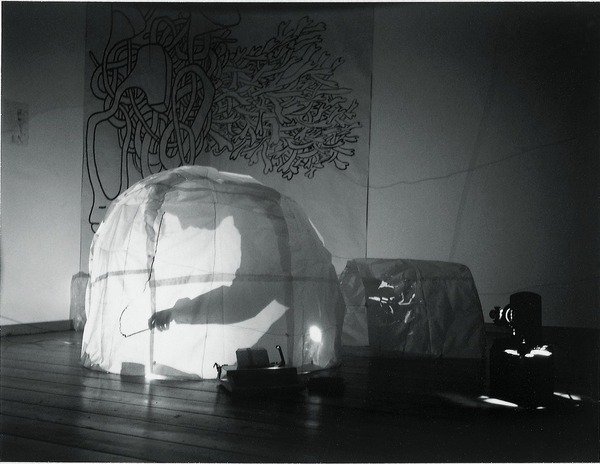Not Just an Image, but a Whole World
dal 18/1/2012 al 16/3/2012
Segnalato da
Bella Angora
Iris Christine Aue
Sophie Dvorak
elffriede
Nikolaus Gansterer
Jochen Holler
Andrea Luth
Nils Olger
Davide Savorani
Edda Strobl
Julia Klaring
18/1/2012
Not Just an Image, but a Whole World
Kunstraum Niederoesterreich, Wien
The show is dedicated to the medium of drawing as an often multi-layered form of narration and attempts to explore the boundaries with other artistic genres. The ten invited artists venture into pictorial representations, figuration and narration, with the drawings themselves becoming the means of communication.

Artists: Bella Angora, Iris Christine Aue, Sophie Dvořák, elffriede, Nikolaus Gansterer,
Jochen Höller, Andrea Lüth, Nils Olger, Davide Savorani, Edda Strobl
Curator: Julia Kläring
“Not Just an Image, but a Whole World” is the title of the first exhibition in the Lower Austria
Kunstraum in 2012. The show, curated by Julia Kläring, is dedicated to the medium of
drawing as an often multi-layered form of narration and attempts to explore the boundaries
with other artistic genres. The inspiration for the title is provided by the comic Die Zeichnung
[The Drawing] by Marc-Antoine Mathieu, in dealing with an initially unassuming, small-
format drawing, opens up a separate, complex world. In the context of the exhibition, this
comic as it were forms the starting point of the narrative thread, a link from drawing to other
media and forms of art, such as performance, film, animation. In the use of the medium of
drawing, the ten invited artists venture into pictorial representations, figuration and
narration, with the drawings themselves becoming the means of communication.
The Viennese artist elffriede vividly shows the changeability of the medium in her
elffriede.sounddrawings, for which she has her drawings set to music by other artists and
then animates the drawings to the sound. Elffriede works at the intersections of different
media, and makes her working processes visible. Thus in the framework of the exhibition
opening she collects words and comments from the visitors and translates these linguistic
ideas into drawings, which, embedded in the exhibition context by her, can open up new
meanings. The often serial drawings of the Italian artist Davide Savorani take up myths and
archetypes that repeatedly appear in his performative rituals. But Savorani also concerns
himself with possible intersections of drawing and performance and the integration of
multiple levels of time in the image.
In the context of the opening, a group of artists record the action they see on paper so as, in a
second step, to add the visitors’ process of perception after they arrive in this action. Two
incompatible levels of time are now linked with one another on paper. In his series of works
Am Zug/Training, Nikolaus Gansterer addresses another way of portraying time and
movement in graphic art, by making drawings of the details he can see from a travelling
train. The claim to record reality here contrasts with the incompleteness and
fragmentariness of the drawings.
With her floral drawing objects, Iris Christine Aue crosses the boundaries of the two-
dimensional sheet of paper into three-dimensional space. Under the title
Wachsender Widerstand [Growing Resistance], in the exhibition room she plants selected
wild plants such as dandelion or common plantain in herbaria that she bases on the model of
the researcher Alexander von Humboldt.
The works of Sophie Dvořák and Nils Olger are concerned with the possibilities of the
reconstruction of reality. In Die sind nicht gerade [They are not straight], Olger translates the
newly acquired tactile forms of perception of his grandfather, who has lost his sight, and then
relates them to photographs of discussion situations with Olaf Jürgenssen and his hands
marked by the years. Dvořák draws recurring motifs from daily newspapers, isolates them
from their context, and mounts them on notice boards with titles such as I: Agree / II:
Demonstrate / III: Arrest. New possibilities of thinking and the questioning of mass-media
image production thereby open up to the observers. Jochen Höller, too, works with existing
text and image elements, which he takes out of their context and combines in new
arrangements. For the collage (Geräuschkulisse) Superman – Chaos im Weltall I [(Sound
Scenery) Superman – Chaos in Space I], for example, he cuts the sound words out of the
comics and arranges them, detached from the narrative, in a new image composition. Andrea
Lüth isolates individual elements from pictures, situations or texts and sets herself the
challenge of graphically reducing them as far as possible to the essential.
According to the requirement, the individual, partly alienated elements allow themselves to
be combined with each other but also with other media such as painting and animation to
create new meaning complexes.
Only on closer observation can a moment of change be discerned in Bella Angora’s drawings,
of her figures’ process of disintegration into the smallest individual components. In view of
the often tiresome competition in the art world, these figures seem to lose their form. But in
her installation STRICH/CODE UND PERFORMANCE/POP, Bella Angora also blurs the
boundaries in her drawings between pop songs and material from earlier performances.
Edda Strobl’s drawings often develop out of interactions with band or performance projects
or in the context of the Tonto comics collective. In the exhibition Strobl shows a selection of
drawings and other materials which as it were come from snapshots from the working
process for the cartoon film Geisterkrieger [Demonic Warriors]. Thus the visitors can
accompany the emergence of a parallel world that opens up a view into our uncertain,
mysterious future.
Like Émile’s drawing, which changes every time it is looked at, each of the works shown here
also contains a possible change, a moment of transformation, a thinkable rethinking.
Image: Projections on Be INK
Press contact: Katrin Draxl, +43 664 60 499 196 katrin.draxl@kunstraum.net
Press tour: 19 Jan. 2012, 17.00
Opening: 19 Jan. 2012, 19.00
Kunstraum
Niederösterreichische Museum Betriebsges. m.b.H.
Kunstraum Noe
Herrengasse 13 A-1014 Wien
Opening hours: Tuesday–Friday, 11.00–19.00 and Saturday 11.00–15.00.
Admission free



